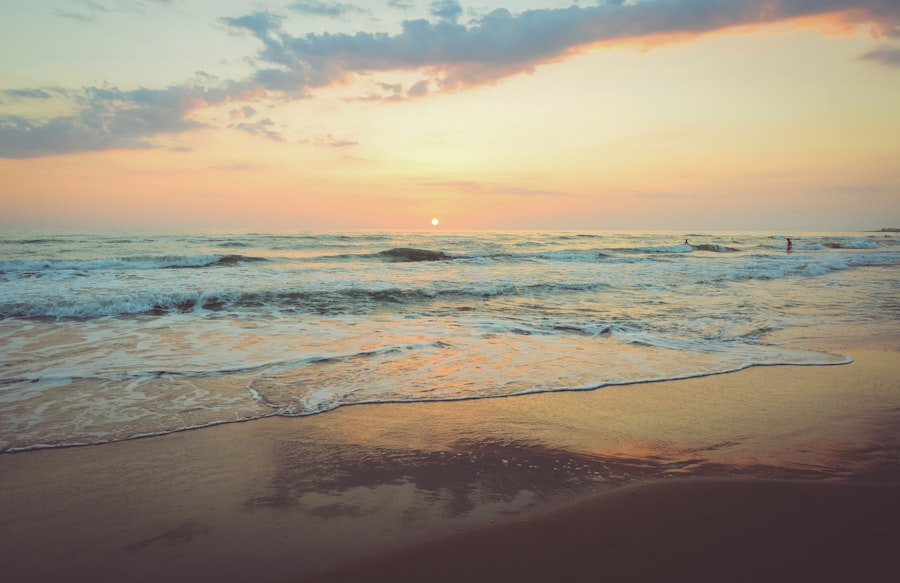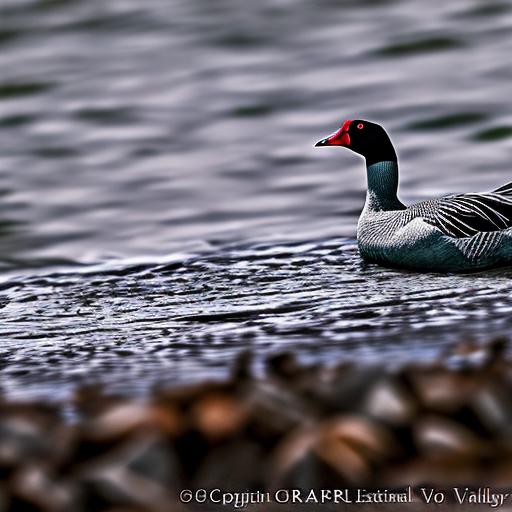Geese on the beach can be a nuisance for both beachgoers and the environment. These large birds are attracted to beaches for various reasons, including the availability of food and open spaces. However, their presence can have negative impacts on the beach ecosystem and the overall beach experience. It is important to find effective methods to keep geese away from the beach in order to maintain a clean and enjoyable environment for everyone.
When geese gather on the beach, they leave behind droppings that can pose health risks to humans. These droppings contain bacteria that can cause illnesses such as E. coli and salmonella. In addition, the accumulation of goose droppings can lead to poor water quality, making it unsafe for swimming and other water activities. Furthermore, geese can damage the beach ecosystem by trampling vegetation and disturbing nesting sites of other bird species.
Key Takeaways
- Geese on the beach can cause a variety of problems for both humans and the environment.
- Understanding the behavior of geese is crucial in developing effective strategies for keeping them away from the beach.
- Keeping geese away from the beach is important for maintaining a safe and healthy environment for both humans and wildlife.
- Natural methods, physical barriers, visual deterrents, and noise-based strategies can all be effective in deterring geese from the beach.
- Regular maintenance is essential for ensuring that these strategies remain effective over time.
Understanding the behavior of geese
Geese are attracted to beaches because they provide an ideal habitat for feeding and nesting. Beaches often have open spaces where geese can graze on grasses and other vegetation. They are also attracted to the presence of water bodies such as lakes or ponds near the beach, where they can find food sources like aquatic plants and insects.
Geese are known for their territorial behavior, especially during nesting season. They will aggressively defend their nesting sites from perceived threats, including humans and other animals. This territorial behavior can make it difficult to deter geese from nesting on the beach, as they will continue to return to their chosen spot year after year.
The importance of keeping geese away from the beach
Keeping geese away from the beach is important for several reasons. Firstly, their droppings can pose health risks to humans. Goose droppings contain bacteria that can cause illnesses such as E. coli and salmonella. These bacteria can be transferred to humans through direct contact or by contaminating the water. Therefore, it is crucial to minimize the presence of geese on the beach to reduce the risk of these illnesses.
Secondly, geese can cause damage to the beach ecosystem. Their trampling behavior can destroy vegetation, leading to erosion and loss of habitat for other bird species. Geese also disturb nesting sites of other birds, which can have negative impacts on their breeding success. By keeping geese away from the beach, we can help preserve the delicate balance of the beach ecosystem and protect the biodiversity it supports.
Natural methods for deterring geese
One natural method for deterring geese from the beach is the use of natural predators. Dogs and hawks are known to be effective in scaring away geese. The presence of a well-trained dog or a hawk flying overhead can create a sense of danger for geese, causing them to seek safer areas away from the beach. However, it is important to note that these predators should be used responsibly and ethically, ensuring that they do not harm or stress the geese unnecessarily.
Another natural method for deterring geese is through landscaping and planting. Geese are attracted to open spaces with easy access to food sources. By planting tall grasses or shrubs near the beach, we can create barriers that make it less appealing for geese to gather. Additionally, planting native vegetation can provide alternative food sources for geese, reducing their reliance on the beach ecosystem.
Physical barriers to keep geese away
Physical barriers such as fencing and netting can be effective in keeping geese away from the beach. Fencing can be installed around sensitive areas or nesting sites to prevent geese from accessing them. It is important to ensure that the fencing is tall enough and properly secured to prevent geese from flying over or crawling under it.
Netting can also be used to cover areas where geese are likely to gather, such as picnic areas or beach entrances. The netting should be installed at a height that prevents geese from landing or walking on it. However, it is important to regularly check and maintain the netting to ensure that it remains effective and does not pose any hazards to other wildlife or beachgoers.
Visual deterrents for geese on the beach

Visual deterrents can be effective in deterring geese from the beach. Decoys and scarecrows can create the illusion of a predator presence, causing geese to feel threatened and seek safer areas. It is important to regularly move these visual deterrents to prevent habituation, as geese can quickly learn that they are not a real threat if they remain in the same location for an extended period of time.
Noise-based strategies for keeping geese away
Noise-making devices such as air horns and whistles can be used to deter geese from the beach. The loud noises created by these devices can startle geese and make them feel unsafe, causing them to leave the area. However, it is important to use these noise-making devices sparingly to prevent habituation. Geese can quickly become accustomed to constant noise and may ignore it over time.
The role of human presence in deterring geese
Human presence can play a significant role in deterring geese from the beach. Geese are naturally wary of humans and will often avoid areas where they are present. By having volunteers or beach staff regularly patrol the beach, we can create a sense of human presence that discourages geese from gathering. These individuals can also educate beachgoers about the importance of not feeding geese, as this can encourage them to stay and become dependent on human food sources.
The importance of regular maintenance for deterring geese
Regular maintenance is crucial for deterring geese from the beach. This includes regular cleaning to prevent geese from being attracted to the beach by food scraps or other debris. It is also important to regularly check and maintain deterrents such as fencing, netting, and visual deterrents to ensure that they remain effective. By staying proactive and regularly maintaining these deterrents, we can minimize the presence of geese on the beach.
Conclusion and final thoughts on keeping geese away from the beach
In conclusion, keeping geese away from the beach is important for both the environment and beachgoers. Geese can pose health risks through their droppings and cause damage to the beach ecosystem. There are various methods for deterring geese, including natural methods such as using predators and landscaping, as well as physical barriers, visual deterrents, noise-based strategies, and human presence. It is important to use a combination of these methods and regularly maintain them for best results. By taking action to keep our local beaches goose-free, we can ensure a clean and enjoyable environment for everyone.
If you’re looking for effective ways to keep geese away from the beach, you might also be interested in learning how to turn a shed into a chicken coop. This article from Poultry Wizard provides step-by-step instructions and helpful tips on transforming a shed into a safe and comfortable home for your chickens. By creating a designated space for your feathered friends, you can not only keep them protected but also minimize the chances of geese invading your beach area. Check out the article here to discover how to repurpose a shed into a functional chicken coop.
FAQs
What are some common problems caused by geese on beaches?
Geese can cause a variety of problems on beaches, including leaving droppings that can be unsightly and unsanitary, damaging vegetation, and potentially attacking beachgoers.
What are some natural ways to keep geese away from beaches?
Some natural ways to keep geese away from beaches include planting tall grasses or other vegetation that geese do not like, using decoys or scarecrows, and using noise-making devices such as air horns or whistles.
What are some non-natural ways to keep geese away from beaches?
Non-natural ways to keep geese away from beaches include using chemical repellents, installing physical barriers such as fences or netting, and using trained dogs to chase away geese.
Is it legal to harm or kill geese to keep them away from beaches?
In most cases, it is illegal to harm or kill geese to keep them away from beaches. However, there may be some exceptions in certain situations, such as if the geese are causing a significant threat to public health or safety.
What should I do if I encounter aggressive geese on a beach?
If you encounter aggressive geese on a beach, it is important to stay calm and avoid making sudden movements. Slowly back away from the geese and try to put as much distance between yourself and the birds as possible. If the geese continue to be aggressive, seek help from a park ranger or other authority figure.
Meet Walter, the feathered-friend fanatic of Florida! Nestled in the sunshine state, Walter struts through life with his feathered companions, clucking his way to happiness. With a coop that’s fancier than a five-star hotel, he’s the Don Juan of the chicken world. When he’s not teaching his hens to do the cha-cha, you’ll find him in a heated debate with his prized rooster, Sir Clucks-a-Lot. Walter’s poultry passion is no yolk; he’s the sunny-side-up guy you never knew you needed in your flock of friends!







